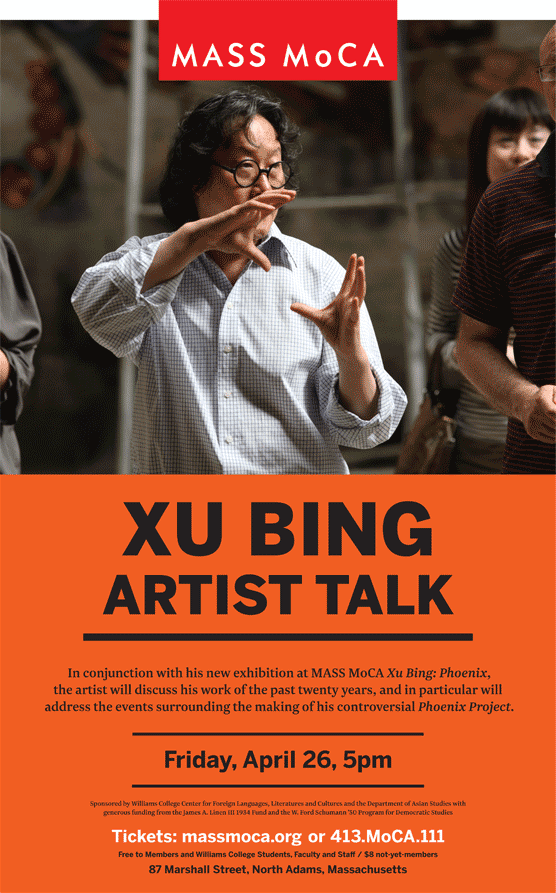Xu Bing, one of the most celebrated contemporary Chinese artists working today, will give a presentation on his work currently on display at MassMoCA. The talk will be held on Friday evening, April 26, at 5PM to coincide with the opening of his third project on calligraphy. His other two works already on display are the large scale Phoenix Project and the Tobacco Project. The discussion will explore the background story of the Phoenix Projects, cover the unusual construction of the sculptures, the symbolism of his work in ancient and modern Chinese culture, and the status of art in China today.
 Xu Bing (1955- ) was born in Chongqing, China but grew up in Beijing. During the final years of the Cultural Revolution he was sent to the countryside to perform farm labor as an “educated youth.” He entered The Central Academy of Fine Arts (CAFA) in 1977, where he studied and taught in the printmaking department, receiving both his bachelor’s and master’s degrees there. In 1990 Xu moved to the United States, eventually relocating to New York in 1992. His work has been the subject of numerous solo and group exhibitions at museums spanning the globe and has been included in various art history textbooks. In 1999 Xu Bing received a MacArthur Fellowship and was awarded an honorary doctorate from Columbia University in 2010. In 2013 Xu’s massive “Phoenix Project” was made the subject of a major solo exhibition at MASS MoCA and Europe’s oldest museum, The Ashmolean Museum, presented a retrospective of his life-long exploration of landscape. He currently works out of his studios in Beijing and Brooklyn, and since January 2008 has served as vice president of CAFA, his alma mater.
Xu Bing (1955- ) was born in Chongqing, China but grew up in Beijing. During the final years of the Cultural Revolution he was sent to the countryside to perform farm labor as an “educated youth.” He entered The Central Academy of Fine Arts (CAFA) in 1977, where he studied and taught in the printmaking department, receiving both his bachelor’s and master’s degrees there. In 1990 Xu moved to the United States, eventually relocating to New York in 1992. His work has been the subject of numerous solo and group exhibitions at museums spanning the globe and has been included in various art history textbooks. In 1999 Xu Bing received a MacArthur Fellowship and was awarded an honorary doctorate from Columbia University in 2010. In 2013 Xu’s massive “Phoenix Project” was made the subject of a major solo exhibition at MASS MoCA and Europe’s oldest museum, The Ashmolean Museum, presented a retrospective of his life-long exploration of landscape. He currently works out of his studios in Beijing and Brooklyn, and since January 2008 has served as vice president of CAFA, his alma mater.
Free for Williams students, faculty and staff and MassMoCA Members. $8 general public admission for the lecture and reception. The lecture will take place in MASS MoCA’s B10 Theater. The galleries will be open before and after the talk.
→ World Renowned Artist Xu Bing to Present Artist Talk at MASS MoCA
→ ARTIST TALK: XU BING
April 26 | 5 PM, MASS MoCA
Sponsored by Williams College Center for Foreign Languages, Literatures and Cultures and the Department of Asian Studies with generous funding from the James A. Linen III 1934 Fund and the W. Ford Schumann ’50 Program for Democratic Studies
